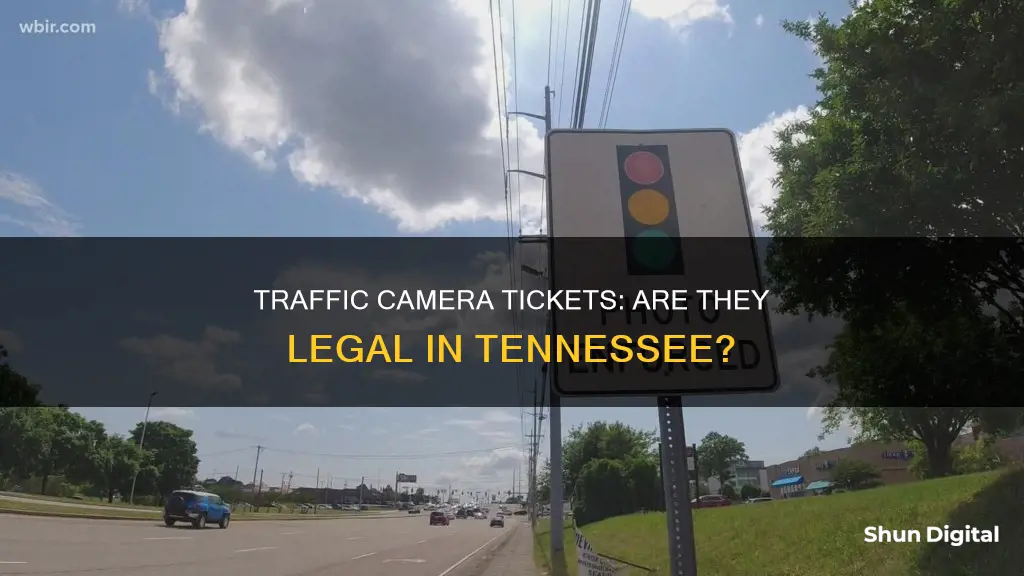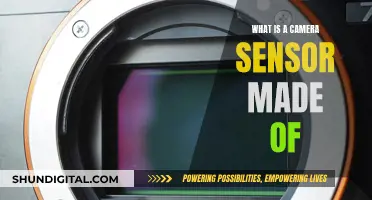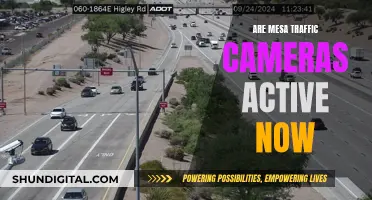
The use of camera traffic tickets in Tennessee has been a controversial topic for over a decade. While some argue that these cameras enhance road safety and boost government coffers, others claim that they are more about generating revenue for private camera contractors and local governments. Tennessee's state law classifies traffic camera citations as non-moving violations, and there are specific requirements that must be met for these citations to be issued. With the ongoing debate and potential changes to legislation, it is important to understand the current laws and their implications.
What You'll Learn

Traffic citations are considered non-moving violations
In Tennessee, traffic citations based on evidence obtained from unmanned traffic enforcement cameras are considered non-moving violations. This means that even if a vehicle is captured in motion, breaking a traffic law, the violation is still classified as non-moving if it was detected by an unmanned camera.
Non-moving violations are infractions that occur when a vehicle is not in motion and do not carry the same weight as moving violations. Moving violations occur when a vehicle in motion violates a traffic law, which can pose a safety risk to the vehicle's occupants, other motorists, pedestrians, or property. Non-moving violations are usually related to parking or faulty equipment issues.
In the case of unmanned traffic enforcement cameras in Tennessee, these cameras are required to undergo a traffic engineering study prior to installation, ensuring they adhere to standard engineering practices. This study must be certified by a licensed engineer specializing in traffic engineering, and vendors are prohibited from conducting these studies or selecting the engineer.
The use of unmanned traffic enforcement cameras in Tennessee is governed by specific legislation, which includes provisions for ticketing procedures, fines, and privacy protections. For example, a POST-certified officer must review the evidence from these cameras, and if a violation is determined, a notice must be sent to the registered owner of the vehicle within a specified timeframe. The fine for such violations is capped at $50, and additional fees or costs may be applied if the fine is not paid or if the violation is contested and the person is found guilty.
It's important to note that Tennessee's unmanned traffic enforcement camera program has specific restrictions on ticketing vehicles turning right or left onto a one-way street at red lights. The evidence must clearly show the vehicle's position before and after the stop line during the red signal to issue a ticket solely based on unmanned camera evidence.
The legislation also prohibits the use of unmanned cameras to monitor speed and issue speeding citations, except within designated school zones and S-curves on public roads.
Tennessee's unmanned traffic enforcement camera program aims to balance road safety with fair enforcement practices, ensuring that violations captured by these cameras are treated as non-moving infractions with standardized procedures and penalties.
Coolpix Cameras: CMOS Battery Power Source?
You may want to see also

Only certified officers can review evidence and determine violations
In Tennessee, only POST-certified or state-commissioned law enforcement officers are authorised to review video evidence from traffic light signal monitoring systems and determine whether a violation has occurred. This is in accordance with the state's 2011 legislation, Public Chapter No. 425 (HB1500/SB1684), T.C.A. § 55-8-198, which outlines the requirements for the use of unmanned traffic enforcement cameras.
The legislation states that if a violation is determined, a notice must be sent to the alleged violator within 20 days of the incident. This notice must include the amount of the fine, which is limited to $50, and any potential additional fees or costs that may result from non-payment or a guilty verdict if the violation is contested. The recipient of the citation then has 30 days from the mailing date to pay the fine.
The legislation also outlines specific circumstances under which a citation may be issued. For example, to ticket a vehicle for failure to come to a complete stop at a red light, the unmanned camera evidence must clearly show the vehicle's front tire before the stop line when the signal is red, and subsequently, the rear tire past the stop line while the signal is still red.
In the city of Knoxville, where there are 21 active red light traffic cameras, a KPD officer reviews the video footage and decides on the citation. If the recipient of the citation chooses to fight it, the reviewing officer would face them in court.
Updating Adobe Camera Raw CS3: A Step-by-Step Guide
You may want to see also

Notices of violation must be sent within 20 days
In Tennessee, a POST-certified officer must review the evidence from a traffic light signal monitoring system and determine whether a violation has occurred. If a violation is determined to have occurred, a notice of violation must be sent to the alleged violator within 20 days of the occurrence of the violation. This time limit is 20 business days, and it starts from the date of the violation's occurrence. The only exception to this rule is in the case of exigent circumstances arising from registration irregularities.
The notice of violation must be sent by first-class mail to the registered owner of the vehicle that was captured by the traffic light signal monitoring system. It must have a Tennessee return address, and all responses and payments must be made to an address in Tennessee. The notice must also allow for payment of the traffic violation within 30 days of the mailing of the notice.
The notice of violation must state the amount of the fine being assessed for the alleged violation. It must also separately state any additional fees or court costs that may be assessed if the fine is not paid on time or if the violation is contested and the person is found guilty of the offense. The fine amount cannot exceed $50.
If the person cited does not pay the traffic citation within the specified time, additional fees or court costs may be assessed. If the person cited appears in court at the specified time and is found guilty of the offense, additional fees or court costs may also be assessed.
Game Winner Camera: How Many Batteries Are Required?
You may want to see also

Fines must be paid within 30 days
In Tennessee, unmanned traffic enforcement cameras are legal and can be used to monitor and enforce traffic violations. These include cameras installed at traffic signals and those that monitor speed. However, there are specific regulations that govern the use of these cameras and the issuance of citations based on the evidence they capture.
When it comes to fines and payments, the law states that violators have 30 days from the mailing date of the notice of violation or citation to pay the fine. This time frame is crucial, as additional fees or costs may be assessed if the fine is not paid within this 30-day period. The registered owner of the vehicle captured by the traffic light signal monitoring system is typically responsible for the payment.
The notice of violation or citation will include information about the amount of the fine and any potential additional fees or court costs that may be incurred if the fine is not paid on time or if the violation is contested and the person is found guilty. It is important to note that the fine amount cannot exceed $50 for a nonmoving traffic violation.
If the person cited does not pay the traffic citation within 30 days, they may still have the option to pay the fine without incurring additional penalties. A second notice will be sent by first-class mail, providing an additional 30 days for payment. However, if the second notice period lapses without payment, further fees and costs will be applied.
Outdoor Surveillance Cameras: Wireless, but Power-Hungry?
You may want to see also

Exempt vehicles include emergency vehicles and funeral processions
Tennessee's unmanned traffic enforcement cameras, or "red-light cameras", are legal and have been in use since at least 2011. These cameras are used to monitor traffic violations and issue citations. However, certain vehicles are exempt from receiving these citations, including emergency vehicles and funeral processions.
The Tennessee Code outlines specific exemptions for vehicles that are actively responding to emergencies. This includes emergency vehicles with active emergency lights, vehicles moving through intersections to clear the way for marked emergency vehicles, and vehicles under police escort. These exemptions ensure that emergency responders can carry out their duties without being hindered by traffic regulations.
Funeral processions are also given special consideration under Tennessee law. Vehicles participating in a funeral procession are exempt from traffic enforcement camera citations. This exemption is in place to show respect for the deceased and their loved ones, allowing them to focus on mourning without the added burden of traffic violations.
It's important to note that while these vehicles are exempt from certain traffic citations, they are still expected to comply with other traffic regulations and laws. For example, the "Move Over Law" (T.C.A. 55-8-132) requires motorists to yield the right-of-way by moving into an adjacent lane or slowing down when approaching emergency vehicles, recovery vehicles, highway maintenance vehicles, or utility service vehicles. This law was enacted to protect emergency and highway workers, and violations can result in fines or even jail time.
Connecting Nest Camera: Computer Setup Guide
You may want to see also
Frequently asked questions
Yes, camera traffic tickets are legal in Tennessee. A traffic citation that is based on evidence obtained from an unmanned traffic enforcement camera is considered a nonmoving traffic violation.
Failure to pay a camera ticket in Tennessee can result in additional fees and court costs. While it is a civil penalty and not a criminal offense, companies can take violators to civil court.
State law limits traffic camera fines to $50 each.







